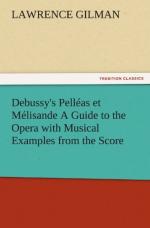The music, as a whole, is as insinuating as it is unparalleled. Many passages are of an hypnotic and abiding fascination. There is something necromantic in the art which can so swiftly and so surely cast an ineluctable spell upon the heart and the imagination: such a spell as is cast in the scene at the Fontaine des Aveugles, in the second act; or when, from the window in the castle tower, Melisande’s unbound hair falls and envelops Pelleas—an unforgettable page; or when the lovers meet for the last time at the Fountain of the Blind; or in the scene of Melisande’s death—one of the most pathetic and affecting pages in all music. One must wonder at the elasticity and richness of the harmonic texture—which, while it is incurably “irregular,” is never crude or inchoate; at the distinction of the melodic line; at the rhythmical variety; at the masterly and individual orchestration. No faculty of trained perception is required justly to value the excellences of Debussy’s score. There is great beauty, great eloquence, in this music. It has sincerity, dignity, and reserve, yet it is both deeply impassioned and enamoringly tender; and it is as absolutely personal, as underived, as was Tristan forty years ago.
THE THEMES AND THEIR TREATMENT
The score of Pelleas et Melisande ill brooks the short and ruthless method of the thematic annotator. As I have pointed out in the foregoing pages, its themes are often so indeterminate, so shadowy and elusive, as to rebuke the analyst who would disengage and expose them. Many of them are simply harmonic hues and half-lights, melodic shreds and fragments, whose substance is as impalpable as mist and whose outlines waver and fade almost before they are perceived. Few of them are clearly and definitely articulated; for the most part they are, as I have called them, mere “sound-wraiths,” intentionally suggestive rather than definitive, evocative rather than descriptive. If one ventures to exhibit and to name them, one does so rather for the purpose of drawing attention to their beauty, their singularity, and their delicate potency, than with any thought of imposing an arbitrary character upon them or of insisting upon what seems to be their essential meaning—which is often altogether too recondite for positive identification. I shall not, therefore, attempt to dissect the music measure by measure, but shall endeavor rather to survey it “in the large,” to offer simply a general indication of its more significant features. Nor shall I offer any further justification or apology for the titles which I have adopted for the various representative themes than to say that they have seemed to me to be sufficiently supported by their association with the moods and events of the drama. It is, of course, entirely possible that apter designations might be found for them; I offer those that I have chosen more as an invitation to the sympathetic and the inquisitive than from any desire to impose my own interpretation upon unwilling, dissenting, or indifferent minds.




